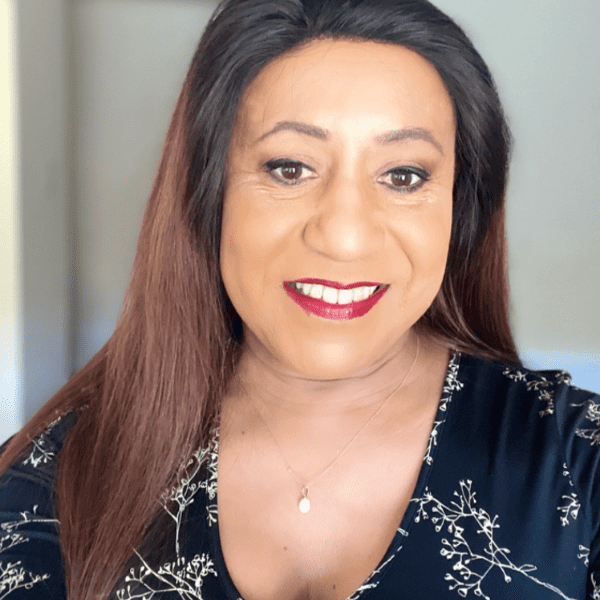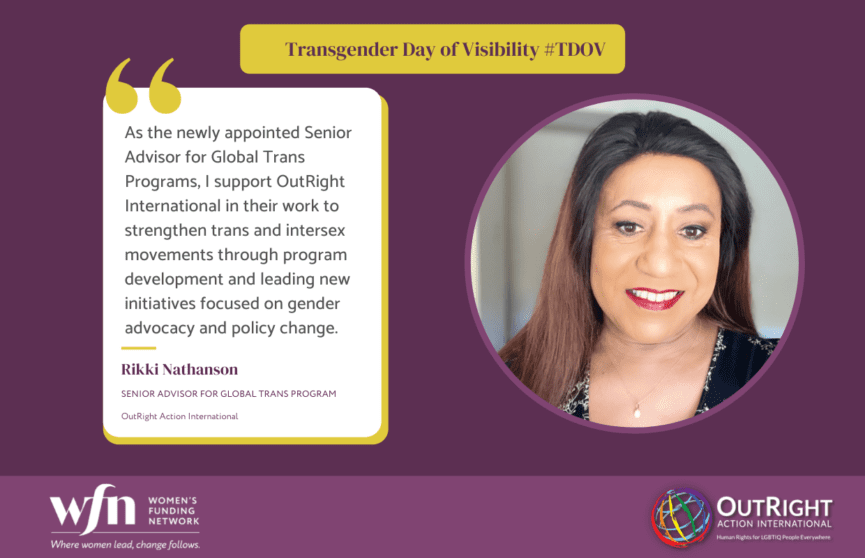On March 31 we celebrate International Transgender Day of Visibility, a day to celebrate the accomplishments and contributions of transgender and nonconforming people while working together to raise awareness of the obstacles that remain to achieving trans justice.
In celebration of this day, WFN President and CEO Elizabeth Barajas-Román interviewed Rikki Nathanson, Senior Advisor for Global Trans Programs at OutRight Action International.
Rikki is a global advocate for the trans community. Among other accomplishments, Rikki founded the first trans organization in Zimbabwe, the Southern Africa Trans Forum, and served on the executive management team at Casa Ruby in Washington DC. She immigrated to the U.S. for her safety after facing persecution in her native Zimbabwe as a result of challenging, and subsequently winning, a case against local police for her unlawful arrest after using a female restroom. The judgement handed down in her ground-breaking civil suit against the government of Zimbabwe has positively changed the legal landscape for trans and gender diverse persons not only in that country, but further afield as well.
Elizabeth Barajas-Román (EBR): Can you tell me about the history of Transgender Day of Visibility, and what it means to you?
Rikki Nathanson (RN): Today is a day where we not only acknowledge and raise awareness of the wrongs and injustices we continue to suffer as trans diverse and gender non-conforming citizens of the world, but it is also a day when we honor and celebrate living members of our community. A day when we stop to take stock and celebrate the lives of those of us that have succeeded in making a positive change in this world. To me personally, it brings hope, as daunting as the idea may be that we can fight a system, and institutions, that are designed to subjugate us and relegate us to the ranks of 3rd, 4th, or even 5th class citizens. We find hope in the small achievements we’ve made, hope that our continued efforts can bring us some relief and respite, and begin to right the wrongs we have faced these many years.
(EBR): As Senior Advisor for Global Trans Programs for OutRight Action International, what does your work entail? How does the creation of this new role impact OutRight’s engagement in trans rights?
(RN): Heading this very new program enables me to prioritize the focus of OutRight’s programming to respond to the needs of a global trans population. I work to support OutRight’s work in strengthening trans and intersex movements through program development and leading new initiatives focused on gender advocacy and policy change. Another important component of my work along with others is working on our approach to gender ideology movements. With the anti-gender movement and its hate-filled rhetoric against trans women in particular, we have a monumental challenge ahead.
(EBR): Are there any U.S. policies that support trans rights? Are there any international trans policies that can provide a framework for U.S. policies?
(RN): In the USA, trans rights vary considerably by jurisdiction. However, it is troubling to note the rapid snowballing in the roll-back of trans rights across the United States. By the end of 2021, at least 130 bills had been introduced in 33 states to restrict the rights of trans persons. Internationally, Argentina is touted as having one of the world’s most comprehensive trans rights laws, being the only country that allows people to change their gender identities by self-determination.
(EBR): How can the WFN Membership take action to support trans rights and visibility?
We need allies, but working allies, that not only pay lip service but fight alongside us in the trenches – advocate for us, seek knowledge to speak from an informed position, and of course, funding is key.
(RN): I have only but “scratched the surface” on the amount of work that needs to go into righting the wrongs faced by us. We need allies, but working allies, that not only pay lip service but fight alongside us in the trenches – advocate for us, seek knowledge to speak from an informed position, and of course, funding is key. As the most under-resourced sector in the LGBT family, our battles are made that much more difficult because of the dire lack of funding earmarked for trans work.
(EBR): Do you have any final advice for the philanthropic community when centering trans and gender nonconforming people in their investments and giving?
(RN): It may appear that the LGBTIQ movement stand for each other. Trans people are not only overshadowed but they are also actively attacked from within our movement, as we wrestle for power and the little funding available. With financial resources being scarce, it is vital that philanthropists must be intentional in their giving to trans and gender-nonconforming people, ensuring that what is given is done so specifically for trans work. Our definition of gender justice and feminism must be expansive and inclusive of trans and gender diverse people and our rights.
Resources for #TDOV from GLSEN:
- Educators, use this gender terminology discussion guide and accompanying visual, plus this pronoun resource.
- Students, check out this Know Your Rights guide to learn about your rights protected in school
- GSA members and advisors, check out this guide on making student clubs inclusive of trans and gender nonconforming students, as well as this GSA activity on telling trans narratives.
- Advocates, use this trans model policy in your advocacy.
About Rikki Nathanson

Rikki Nathanson (she/her) comes with a wealth of experience in the corporate business management and non-profit sectors, in excess of 20 years. With her comes extensive knowledge in finance, organizational development and movement building. Before joining OutRight, Rikki worked for 2 years in the Executive Management Team of Casa Ruby in Washington DC in several capacities. She ended her tenure as Director of Housing Programs. She also served on OutRight’s board of directors from October 2019, recently ending her term as Chair of the Finance Committee.
An immigrant, she moved to the USA from Zimbabwe for her own safety after challenging, and subsequently beating, the police for her unlawful arrest after using a female restroom. The judgement handed down in her ground-breaking civil suit against the government of Zimbabwe has positively changed the legal landscape for trans and gender diverse persons not only in that country, but further afield.
Whilst in her native country, she formed and successfully registered the first trans-specific and trans-led organization. She went on to be instrumental in the formation of the Southern Africa Trans Forum and vigorously continues her global trans activism in her affiliation to several trans organizations and movements globally. Rikki holds a qualification with the Institute of Chartered Secretaries & Administrators of Zimbabwe.
